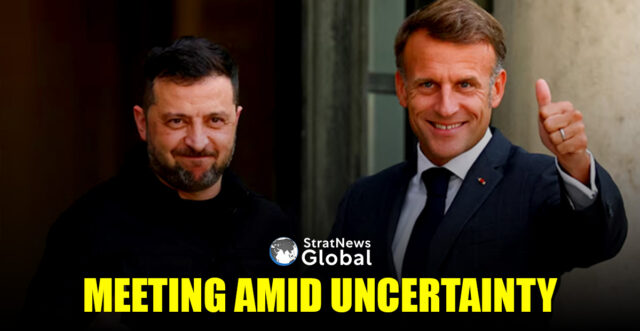Around 30 Western leaders met with Ukrainian President Volodymyr Zelenskyy on Thursday to discuss security guarantees for Kyiv in a potential peace deal with Russia, aiming to secure U.S. support for their initiative.
The summit in Paris of the “coalition of the willing” brought together leaders from Europe, Australia, Japan and Canada, with even neighbouring countries choosing to attend by video-link.
Members of the coalition, which does not include the U.S., have talked for months at various levels to define their prospective military support for Ukraine to help deter Russia from attacking it again if and when there is a final truce – currently still a remote prospect.
But those efforts have stalled as governments have said any European military role would need its own U.S. security guarantees as a “backstop”. President Donald Trump has made no explicit commitment to provide those.
Trump Envoy Meets Europeans
His special envoy, Steve Witkoff, met several senior European officials in Paris on Thursday morning before the meeting, two diplomats said.
French President Emmanuel Macron said alongside Zelenskyy in Paris on Wednesday that the coalition leaders would endorse plans for security guarantees drawn up by their militaries.
Two European officials said the “technical” plans had been finished, without going into detail on what that actually meant.
British and French army chiefs were to brief the leaders on Thursday, according to an outline sent to attendees.
“We are ready, we Europeans, to provide security guarantees to Ukraine for when there is a signed peace,” Macron said, adding that it was now a question of seeing how sincere Russia was.
The two European officials said the aim would be to send a political signal to Trump. This would highlight the lack of progress toward direct peace talks between Russian President Vladimir Putin and Zelenskyy since Trump hosted Putin in August, and prod Trump to raise pressure on Moscow now.
Having rolled out the red carpet in Alaska, Trump on Wednesday accused Putin of conspiring with China and North Korea after the three countries’ leaders staged a show of unity in Beijing at a lavish commemoration of the end of World War Two.
NATO Secretary General Mark Rutte said on Wednesday he expected clarity from the coalition soon on what could be delivered, and this would pave the way for more intense discussions with Washington on what guarantees it could provide.
Peace In Ukraine Still ‘Illusory And Remote’
Putin told Kyiv on Wednesday there was a chance to end the war in Ukraine via negotiations “if common sense prevails”, an option he said he preferred, although he was ready to end it by force if that was the only way.
Western officials say the key element of the guarantees will be continuing strong support for Ukraine’s armed forces.
But they were also expected to include an international force to assist and reassure Kyiv, based both in Ukraine and in neighbouring countries, even though Russia is emphatically opposed to any foreign deployment in Ukraine.
Diplomats say big differences remain among allies on the issue.
European leaders have made clear such a force will only be feasible with U.S. backing – something Trump promised last month in general terms. But Washington has yet to spell out what it is willing to contribute.
Some of the leaders will call Trump after the summit, the French presidency said.
John Foreman, a former British defence attache to Kyiv and Moscow, said it was important to understand exactly what is on offer – especially for Zelenskyy as he weighs his position ahead of any direct talks with Russia.
“That said, there is growing realisation that peace will require a strong Ukraine and Ukrainian army, that European support will need to be long-lasting, and that Ukraine probably can’t rely on its allies coming to its aid to punish Russia should it re-attack,” he said.
“This is all prep work for a peace which remains illusory and remote due to Trump’s incoherent diplomacy and the lack of substantive talks.”
(With inputs from Reuters)





